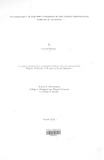| dc.contributor.author | Masson, Charles | |
| dc.date.accessioned | 2016-05-31T07:15:32Z | |
| dc.date.available | 2016-05-31T07:15:32Z | |
| dc.date.issued | 2011 | |
| dc.identifier.uri | http://hdl.handle.net/11295/95995 | |
| dc.description.abstract | This study was undertaken to assess the impacts of adoption of various types of coffee certifications on the livelihoods of smallholder farmers. The main objective of this study was to compare the livelihood of farmers under the different producer groups with respect to their income and food security situation. It begins with an introduction to impact assessment and a description of the methodology and its challenges with an outline of the method used for handling outliers and comparing the certified and non certified farmers and the producer groups. Secondary data from coffee survey data collected by COSA and partners for analyzing the impact of sustainability standards forms the basis of this study. Multi stage cluster sampling was used to sample farmers that were interviewed. In the first stage, the coffee growing areas in Tanzania and the active certification programs were identified. Then second level producer groups that had obtained certification were used to obtained the sampling frame of the first level producer groups. Random sampling was then used to select the first level producer groups and also randomly select villages with farmer in the producer groups. Non parametric methods have been used to compare the producer groups because one sample does not follow a normal distribution and most of them are highly skewed. Error bars plots have been used to compare the significance difference in the producer groups. Aggregate income from the different forms in which coffee was sold has been computed and used for comparison. It also evaluates the food security situation last production year of the farmers across the different producer groups. The key indicators used showed that generally adoption of the various coffee certifications programs have positive impacts on income and food security. In the course of this study,-the areas of further research that emerged are; an evaluation of the farmers livelihood before intervention is done to ascertain whether their livelihood has changed due to adoption of certification or due to other factors and the development of a stepwise procedure for an outlier identification and ascertaining their validity. The methods that were used for outlier detection were subjective. | en_US |
| dc.language.iso | en | en_US |
| dc.publisher | University of Nairobi | en_US |
| dc.rights | Attribution-NonCommercial-NoDerivs 3.0 United States | * |
| dc.rights.uri | http://creativecommons.org/licenses/by-nc-nd/3.0/us/ | * |
| dc.subject | coffee certification Schemes | en_US |
| dc.title | An assessment of farmers livelihood in the coffee certification Schemes in Tanzania | en_US |
| dc.type | Thesis | en_US |



